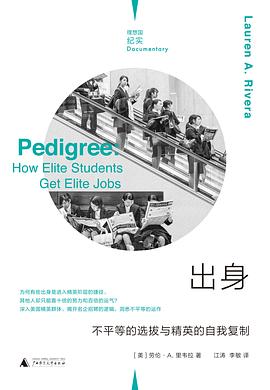WULOLIFE
《出身: 不平等的选拔与精英的自我复制》作者: [美]劳伦·A·里韦拉 出版社:理想国|广西师范大学出版社
《出身: 不平等的选拔与精英的自我复制》作者: [美]劳伦·A·里韦拉 出版社:理想国|广西师范大学出版社
Couldn't load pickup availability
Description
内容简介· · · · · ·
【编辑推荐】
★出身不一定决定命运,但决定了改变命运的难度。
名校毕业、成绩优异,就能顺利获得高薪offer、进入精英阶层吗?这可能只是万里长征的起点。名企选拔的标准对家境优渥的学生更有利,招聘官眼中的“优秀”特质往往需要几年甚至十几年的熏陶和培养。看似公平的竞争,以及其他群体向上流动的壁垒。
★深入精英群体内部,揭开名企精英选拔的逻辑。
以美国三个高起薪行业——投行、咨询和律所为例,详细分析了顶尖企业挑选新人的过程。招聘官更看重契合、光鲜、驱动力等主观因素,本质上是在挑选与自己合得来的“同类人”。
★详细呈现普通人跨越阶层要了解的内部知识。
《出身》细致考察了宣讲会、内部推荐、简历通过丰富为普通人打破文化壁垒、突破阶层天花板提供了可能。
Axiom业图书奖,《经济学人》《金融时报》《大西洋月刊》《泰晤士高等教育研究》等媒体齐声推荐。
【内容简介】
一是什么阻碍了穷人摆脱贫困,二是什么助力了富人维持富有。在阶层固化日益让人焦虑的今天,对后一个问题的探讨更为重要。为什么在我们的社会中,获得高薪职位的往往是来自富裕家庭的学生?是什么让他们顺利通过选拔?
为了回答这些问题,劳伦 · A.百位招聘官和求职者,详细考察了宣讲会、内部推荐、简历投递、面试和评议等招聘环节,通过丰富的案例,揭示出看似能力取向的选拔标准如何帮助精英阶层完成了优势地位的代际传递。除对选拔机制的分析外,书中披露的大量招聘内部知识,亦可作为普通人突破阶层天花板的行动指南。
作者简介· · · · · ·
劳伦·A. 里韦拉(Lauren A. Rivera,美国西北大学管理学顶级专业服务公司的招聘与晋升过程,其研究曾得到《大西洋月刊》《经济学人》《财富》《纽约时报》《华尔街日报》和美国国家公共电台等Thinkers 50 Years ago
